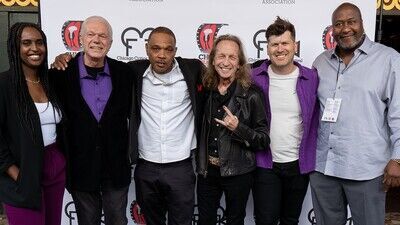CM: We’re getting military uniforms now.
SDJ: They’re bringing in little fake weapons. Of course, at the end of the evening, they were very strict about how they accounted for everything. It was just amazing to watch that happen in a matter of time and to witness people’s perception of the formerly incarcerated change. The superintendent started coming over to my myself: Hey, Mr. Johnson.
CM: Now, it’s Mr. Maclin! [Laughs] That’s when you realize the real power of art. Because there were officers that used to look down their noses at me, change. They’re asking for my autograph.
PR: Now, all of a sudden they’re star fuckers.
SDJ: Actually, when I found out I was leaving, there was a long line of officers waiting to shake my hand. That blew me away. That made me a believer that I could change other people’s perceptions.
PR: That is the power of theater. It’s seeing yourself.
SJ: For me, it was like almost being drunk because I was an introvert. I was one of those guys who didn’t say more than four words. I used to just sit in the corner, working out, just looking at people. I didn’t say much because every time I did open my mouth, people would take it the wrong way.
CM: Because you’re a big guy and we’re already looking for the wrong thing.
SDJ: Through the arts, I began to develop a vocabulary. I started developing a demeanor, and, at one time, I didn’t smile. Now I smile a lot.
You’ve all been on a journey, from making the film, through its premiere at TIFF, until now. Could you talk about what you’ve taken from this time?
CM: Going through this journey? What it was like for me, man, it was like a reunion in a sense. It’s like us coming back together again to put on another production. When we were in prison, putting on productions, those were the greatest times. Because at that moment, we were not in prison. I’m free. I’ve been to Greece. I’ve been to Egypt. I’ve been all over the world, right from my cell just because I learned how to read a script, to find empathy, compassion, all these types of things inside the human condition. That’s what I look for in the script. I try to find the human, the compassion and the empathy and interpret that to the world. We found all of that in that and we put it into the movie.

